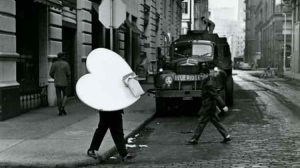Waterloo by J.T. Welsch / Like This Press / Saddle-Stitch, 36 pages
The twenty-four numbered but untitled poems, and almost as many monochrome images, of J.T. Welsch’s Waterloo begin with a wake. The first poem quickly makes clear that though a death may have served as the impetus for this series, the poems will not really be about grief: “Between the storm and jetlag, the wake was spent / trying not to laugh.” “Waterloo,” as a map and various newspaper clippings the later poems prove, is not a last stand or a tragedy but a place in Illinois.
 These same clippings, together with historical images, and collages made of vital records, contribute to the impression of a scrapbook, as if, following the grandmother’s funeral, her surviving family members pasted together memories, not only of her life, but of the history (personal and otherwise) that went on around her. When they appear, small and in low resolution, on the same pages as the poems, this impression is strengthened.
These same clippings, together with historical images, and collages made of vital records, contribute to the impression of a scrapbook, as if, following the grandmother’s funeral, her surviving family members pasted together memories, not only of her life, but of the history (personal and otherwise) that went on around her. When they appear, small and in low resolution, on the same pages as the poems, this impression is strengthened.
As a scrapbook, Waterloo tells the story of an extended family. The parliament of owls, mentioned in the final line of poem one does not consist of “the more valuable porcelain owls” the women in the family divide up but in the poems themselves as they ask, Who? Who was Grandma? Who were the people around her? Who are the people who remain?
Though the speaker of this series clearly lives at some distance from the extended family—hence the jetlag—he does not seem to hold himself above his relatives. The five couplets that make up each poem, with lines that at their longest barely exceed ten syllables, leave little space for anything beyond plain statements of what happens, even if enjambment, prominent throughout, allows for more complicated sentence structures than the sparse appearance of these poems would suggest.
Take the third poem of the series, for instance. After introducing Billy, Kayla’s boyfriend who thinks nothing of pulling “a huge knife out of his boot” when Christmas presents prove difficult to open, the final three stanzas skip ahead several years:
Now, every year is a chance to show all
the new impressions he’s taught their brightorange-haired three-year-old. At the funeral,
when the power was out, I could hear herdoing the Bud Light frogs from where I stood
at the casket, holding up the flashlight.
The speaker does not judge the father for teaching the little girl to imitate the crass commercial figures used to advertise a corporate brewer’s product, nor does he judge the child for failing to respect the solemnity of the occasion. Indeed, there is just the hint of complicity in that failure, given that the speaker earlier mentioned that the very storm which, presumably, has knocked out lights made it difficult not to laugh at the wake. The meaning, and the good humor, carry over from one poem in the series to he next so that the relationship between the poems in the series is the macrocosm to the microcosm of the sentences that flow from line to line.

This family scrapbook ends with “a dark smoke trail in the distance” and a picture of a freeway sign marking the limits of Waterloo. There is a sense of an ending, or at least a departure, even if not an entirely conclusive one. Scrapbooks, after all, can only end for now since they are made by those who continue to make the story they tell. This sense of an onward journey completes the family album that J.T. Welsch has made so skillfully in Waterloo.





Leave a Reply